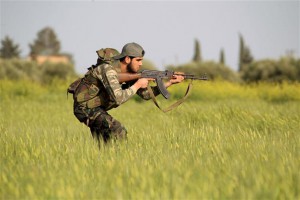Around 40 U.S. Special Forces members have arrived in Turkey to join their Turkish colleagues in training Syrian rebel groups to fight the Islamic State of Iraq and the Levant (ISIL), sources have told Hürriyet.
The U.S. soldiers have moved to the Hirfanlı gendarmerie base in the Central Anatolian province of Kırşehir, where they will start the training in 10 days, the sources said.
Turkmens are said to be the most prominent group among those to be trained and Turkey’s National Intelligence Organization (MİT) is currently selecting the rebels to join the program. The process of picking the rebels will be completed soon, according to sources.
The rebels will be trained in Turkey in groups of 400.
The start of the program was initially scheduled for the end of last year, before it was postponed to February, but the talks between the Turkish and U.S. officials continued until recently.
A U.S.-led program will start in May, Turkish Defense Minister İsmet Yılmaz was quoted as saying by the state-run Anadolu Agency on March 31.
Details on the training have been scant up to now.
Turkish Foreign Minister Mevlüt Çavuşoğlu said on March 27 that the program had been delayed by Washington, but described the delay as “minor” and said that “everything is on track” in technical and political terms.
U.S. President Barack Obama spoke with Turkish President Tayyip Erdoğan on March 26 about pressing issues in the Middle East, the White House had stated at the time.
Obama and Erdoğan discussed their cooperation fighting ISIL militants and “common efforts to bring security and stability to Iraq and Syria,” the White House statement said.
“The two leaders reviewed the train-and-equip program for vetted members of the moderate Syrian opposition. They discussed efforts to deepen cooperation to stem the flow of foreign fighters,” it added.
A broader picture of the training of Syrian rebels includes a program in Jordan that has already started. Some 2,000 Syrian rebels will be trained as part of the program in Jordan, with the total number increasing to 5,000 when branches in Saudi Arabia and Qatar are included.



